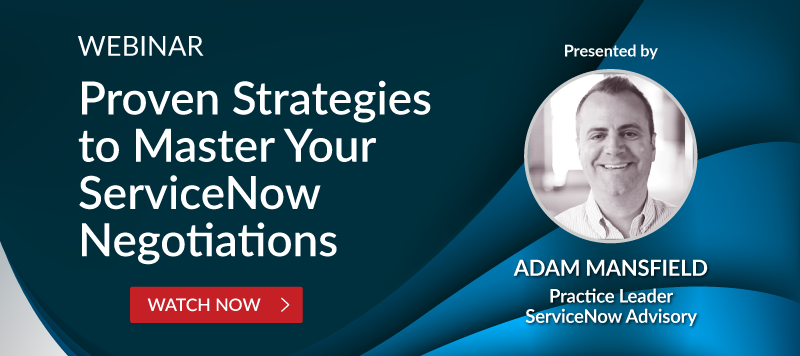- Adam Mansfield
- Reading Time: 4 minutes

ServiceNow CEO Bill McDermott said last week that $7.4 trillion will be invested in digital transformation over the next three years. The main driver? Dealing with the new reality of COVID-19, in which the workforce will become more digital. According to McDermott, “COVID-19 has pulled companies into the world of virtual work rapidly, and they will now embrace a permanent transformation.”
The large $7.4T presents a huge opportunity for enterprise cloud vendors to become true mainstay strategic partners now. This means these vendors will be heavily relied on to achieve the outcomes expected as a result of these significantly important digital transformations.
Will only the big players benefit because of their breadth and scale? When it comes to the goal of achieving the most optimal digital workforce, Microsoft is going to benefit the most. They have longstanding relationships in place, often at the top of enterprises (CEO, CFO), and their portfolio of solutions can be geared towards enabling a truly optimized digital workforce. Microsoft is the most expansive, providing the productivity solutions (Office 365), the collaboration functionality (Teams) and a cloud platform solution (Azure).
But in walks ServiceNow. ServiceNow is an invaluable, mission-critical partner for IT, HR and Customer Service departments within global enterprises. They just delivered a very strong quarter where subscription revenues increased to $995M, representing a 34% year-over-year growth. What was particularly impressive was that ServiceNow closed 37 deals in the quarter that had at least $1M in annual spend tied to them, representing 48% year-over-year growth. Today the company has over 933 customers that fit that description and a 97% renewal rate, meaning almost the entirety of ServiceNow’s revenues are locked in with a high level of predictability.
More than 75% of ServiceNow’s customers are now multi-product purchasers and 90% of ServiceNow’s biggest deals in the quarter included multiple solutions. The company says that “ServiceNow has proven to be a key business continuity tool during the COVID-19 crisis and is now solidifying itself as a key tool to enable remote employees to eventually return to work.” Higher productivity now and business continuity later are key selling points.
ServiceNow’s Customer Positioning
ServiceNow seized the opportunity. It responded to the unprecedented market downturn by going directly to customers with a “Fast-Start Playbook” featuring pre-packaged bundles. Their late-April internal ‘prospecting day’ based on the Fast-Start Playbook yielded a 3X greater pipeline than any other prospecting day in history. This means that ServiceNow starts this quarter with a much larger pipeline than last year’s Q2.
The Fast-Start Playbook promises customers who buy one of five different product bundles a quick time to value. The bundles are based on different go-to-market strategies that customers have the need for in today’s climate. It seems all of the products making up the bundles are already developed and individually sold but will be now grouped together into solutions to map to customer needs.
The five areas, or “plays,” that ServiceNow are selling to are:
- Digitally scaling business operations
- Reducing technology debt
- Business resilience
- Enhancing the digital employee experience
- Creating new workflows
In fact, based on a recent CNBC interview with McDermott expect ServiceNow to make claims that the ROI on these bundles will be at least 5X the amount invested in a given year and the payback will be seen in less than six months.
Are Bundles a Win/Win?
Clearly bundles would further strengthen ServiceNow’s renewable revenue stream which would speak volumes for an up and coming enterprise cloud vendor, especially in an uncertain world. If the ServiceNow philosophy is right, enterprise customers can also reap fast payback.
But questions arise for the longer term:
Question 1: What if a customer wants to decouple products in the future? Generally speaking, If a customer needs to drop one of the bundled products because it is no longer needed or was never actually used, the per unit price of the other individual products will significantly increase. This would effectively wipe out the financial benefit of bundling and force you back to the bundle. Also, if you achieved renewal protections, you know they typically require you to maintain volumes and the exact products to get the benefit of the protection.
Recommendation: Negotiate discounted pricing for the individual products making up the bundle and have it memorialized in the contractual paperwork, then push for language that allows you to decouple and have the pre-negotiated individual product pricing available. You do not want to be stuck paying for air. Ensure there is a layer of flexibility built in today before you jump in. Make sure you get renewal protections for the individual product pricing and the bundle pricing as well.
Question 2: What if your bundle doesn’t truly give you fast time to value? Six months is not very long when you consider all of the extenuating circumstances in today’s economic climate. Even though ServiceNow is calling it a fast-start playbook, what if it’s not? What if the expected ROI is not achieved? And how is the ROI actually determined?
Recommendation: ServiceNow is not going to give a credit or refund but they can give you commitments tied to future flexibility. Ensure the products that you are adding that are valuable today will have the layer of flexibility to adjust to your future requirements to help drive the expected value receipt and ROI. Pay attention to the functionality as you grow and change. Ensure before you sign on the dotted line that you get commitments from ServiceNow allowing for you to swap products or reduce committed volume.
If you’re already a ServiceNow customer, expect to be approached to add onto your current product with a bundled solution. ServiceNow will aggressively be pushing these bundles to your C-Suite. McDermott even mentioned during the recent earnings call, that the C-Suite is actually easier to get in touch with during the COVID-19 pandemic. In fact, Bill McDermott is famous for successfully creating relationships with large company CEO’s and getting vision buy-in. McDermott is one of the most competitive executives – if not the most competitive – in the technology industry and he is focused on winning at ServiceNow. He is focused on blowing past the $10B marker he and ServiceNow have already put out there.
If you are considering adding ServiceNow to your portfolio of cloud vendors, expect to be presented a bundle at the onset. Pay close attention to what it offers versus what you’ll need in areas such as functionality, level of customer support, and mobile device and integration abilities.
Comment below, follow me Adam Mansfield on Twitter @Adam_Mansfield_, find my other UpperEdge blogs and follow UpperEdge on Twitter and LinkedIn.
What to Read Next:
Related Blogs
ServiceNow Now Assist Negotiations: From Strategic Preparation to High-Impact Deal Tactics
How ServiceNow Customers Can Get the Most Out of Knowledge (Before, During and After)
SaaS Vendors Push Consumption-Based Licensing for AI Offerings: What Customers Need to Know
About the Author

